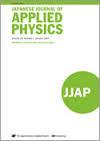Research on optical properties of Eu3+ doped bismuth silicate crystals based on first principles
IF 1.8
4区 物理与天体物理
Q3 PHYSICS, APPLIED
引用次数: 0
Abstract
This paper is based on the first principles of density functional theory and uses the virtual crystal approximation method to calculate and analyze the optical properties of differently proportioned Eu3+-doped Bismuth silicate (Bi4Si3O12, or BSO). The results show that minor Eu3+ doping (1/12–1/3) improves the polarization ability of BSO and reduces energy loss. Additionally, doping an appropriate amount of Eu3+ (1/12–1/3) can improve light absorption and transmission of BSO to some extent. That is to say, Eu3+ doping improves the response of BSO to infrared light, and the absorption capacity in the ultraviolet and visible light regions is also enhanced. The theoretical research in this paper elucidates the changes in the optical properties of BSO after doping with Eu3+, providing a theoretical basis for expanding its application as a scintillation crystal in high-energy physics experiments, nuclear medicine, and other fields.基于第一原理的掺 Eu3+ 硅酸铋晶体光学特性研究
本文基于密度泛函理论的第一性原理,采用虚拟晶体近似法计算和分析了不同比例掺杂 Eu3+ 的硅酸铋(Bi4Si3O12,或 BSO)的光学性质。结果表明,少量 Eu3+ 掺杂(1/12-1/3)可提高 BSO 的极化能力并减少能量损失。此外,掺入适量的 Eu3+(1/12-1/3)还能在一定程度上提高 BSO 的光吸收和透射率。也就是说,掺杂 Eu3+ 可以改善 BSO 对红外光的响应,同时还能增强其在紫外光和可见光区域的吸收能力。本文的理论研究阐明了掺杂 Eu3+ 后 BSO 光学性质的变化,为扩大其作为闪烁晶体在高能物理实验、核医学等领域的应用提供了理论依据。
本文章由计算机程序翻译,如有差异,请以英文原文为准。
求助全文
约1分钟内获得全文
求助全文
来源期刊

Japanese Journal of Applied Physics
物理-物理:应用
CiteScore
3.00
自引率
26.70%
发文量
818
审稿时长
3.5 months
期刊介绍:
The Japanese Journal of Applied Physics (JJAP) is an international journal for the advancement and dissemination of knowledge in all fields of applied physics. JJAP is a sister journal of the Applied Physics Express (APEX) and is published by IOP Publishing Ltd on behalf of the Japan Society of Applied Physics (JSAP).
JJAP publishes articles that significantly contribute to the advancements in the applications of physical principles as well as in the understanding of physics in view of particular applications in mind. Subjects covered by JJAP include the following fields:
• Semiconductors, dielectrics, and organic materials
• Photonics, quantum electronics, optics, and spectroscopy
• Spintronics, superconductivity, and strongly correlated materials
• Device physics including quantum information processing
• Physics-based circuits and systems
• Nanoscale science and technology
• Crystal growth, surfaces, interfaces, thin films, and bulk materials
• Plasmas, applied atomic and molecular physics, and applied nuclear physics
• Device processing, fabrication and measurement technologies, and instrumentation
• Cross-disciplinary areas such as bioelectronics/photonics, biosensing, environmental/energy technologies, and MEMS
 求助内容:
求助内容: 应助结果提醒方式:
应助结果提醒方式:


